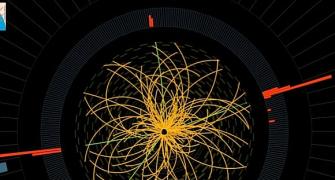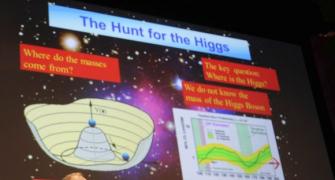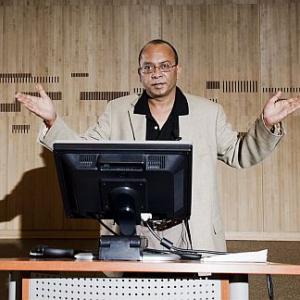Rajeev Srinivasan wonders about the meta-events surrounding the apparent discovery of the 'God particle'.
It has been well-nigh impossible to open a newspaper or browse a Web site in the recent past without being bombarded with stories about the Higgs boson.
What exactly does the apparent discovery of the existence of the Higgs boson, the infamous 'God particle' do to our daily lives? Not much, so far as I can tell. Of course, questions about the fundamental nature of the universe are good to speculate about, but the hype about the Higgs boson has been a little bit beyond reasonable.
In fact, an issue with far more immediate impact on our wallets, the alleged manipulation of the LIBOR by Barclays Bank, with possible malfeasance by the Bank of England and other central and commercial banks, has been drowned out by the Higgs boson uproar.
The fact that a fine of $465 million has been levied, and that many trillions in derivatives trades are benchmarked on the LIBOR interest rates, suggests that massive theft has been unearthed. But let us put that aside for now.
Why is the Higgs boson so important? With my layman's humility, I listened carefully to a conversation between a theoretical physicist at Stanford's Linear Accelerator Center and an experimental physicist (and member of the ATLAS team at CERN) from the Lawrence Livermore Labs/UC Berkeley.
What the boffins said I understood as follows: The Higgs boson is a manifestation of a Higgs field that permeates the universe. It is the perturbation of this field by a particle travelling through it that actually gives the particle its mass -- sort of by analogy with a body moving through a viscous fluid, where the friction created can be seen as a sort of 'mass'.
Given the quantum nature of the Higgs field, it can be simultaneously a particle and a field. If the field is excited with enough energy, it manifests itself as an extraordinarily short-lived particle, which decays into other particles instantly.
It is these second-order particles that can be observed. The Large Hadron Collider (LHC) at CERN is the first device that can smash particles travelling at high enough energy levels that there is a fair chance of Higgs boson decay being observed.
There is a non-trivial probability that the observed decay into a few longer-lived particles could have been the result of the creation of some exotic short-lived particle other than the Higgs boson. So the excitement about the July 4th announcement from CERN was that they had managed to get to 5-sigma (99.9999% confidence) that it was indeed a Higgs boson they observed.
That the Higgs boson has been more or less certified to exist is good news for the Standard Model, the prevailing orthodoxy, that can explain electromagnetism as well as the weak and strong nuclear forces. Curiously, however, this theory cannot explain gravitation, as you have to look to Einstein's General Relativity Theory for that. Mass causes gravitation, and mass is created by the Higgs field; yet the Standard Model cannot explain it? That seems, somehow, unsatisfactory and non-intuitive.
Thus the true Holy Grail, the Grand Unified Theory (GUT) of Physics, is not in sight. There is a tendency in the West to symbolise Einstein as the epitome of genius: indeed, The Economist's self-congratulatory leader mentioned in passing that general relativity was the product of a single mind, while many have been working on the Standard Model.
Without demeaning Einstein, I believe the most astounding achievement of a single human mind in all of history was that of Panini, 2,500 years ago. He achieved a Grand Unified Theory of Language: An even more daunting task. Panini had the audacity to imagine that the infinity of language could be captured in a finite number of rules; he did this by defining Paninian Sanskrit in some 4,000 rules. Computer scientists in the 1950s rediscovered the Paninian rules for formal languages; for instance the C language is defined by 100 or so rules in the Panini-Backus form.
It may well be that there is no corresponding GUT in physics: for, as people delve deeper and deeper, it seems to get more and more chaotic. For instance, at one time the atom was considered the smallest particle; then we heard of electrons, neutrons and protons. These were further found to be based on more elementary particles like quarks; the bestiary now includes neutrinos, photons, muons, leptons etc.
There are two whole categories of particles: bosons and fermions. There is String Theory that suggests that the particles themselves are in effect, 'strings' that vibrate. And they have 'flavors', 'spin' and 'charm'? This is altogether too complicated.
A certain Cartesian vanity afflicts Western science -- the idea that by digging ever deeper it is possible to understand reality completely. There are two reasons to doubt this: One is the famous Uncertainty Principle of Heisenberg. The other is the observed tendency in nature of aggregation, where in a complex system, the whole is greater than the sum of its parts (think of an ant colony).
Therefore, the quest for finding the true building blocks of matter may well be a. impossible because Uncertainty fundamentally limits what can be known: Nature may want to keep a few secrets b. aggregation may make the individual parts irrelevant. I don't think the 'God particle' is going to render philosophy or God itself immaterial.
There is also the question about whether this is the last hurrah of Big Physics. The $10 billion price tag for the Large Hadron Collider is not necessarily something that cash-strapped Europeans and Americans can afford into the future; it may well be that the mantle of physics will move on to others.
This has happened before: First it was the Germans (Planck, Heisenberg, Einstein); then the British (Rutherford, Dirac); and later the Americans (Oppenheimer, Fermi) who dominated. Who knows, maybe in future it will be Asians who dominate.
Unfortunately, the tendency to not give credit to non-whites persists. S N Bose, the eponymous discoverer of bosons was never nominated for the Nobel Prize, even though Einstein himself gave him priority in the Bose-Einstein Condensate. Panini is not given due credit: The formal languages definition, despite strenuous efforts to give the original discoverer priority, is still called the Backus Normal Form.
Thus, despite the genuine and understandable excitement about the Higgs boson, there is something rather unsatisfying about the whole thing. There is also the possibility that a century from now, people will look back upon us condescendingly, wondering how on earth we could have been so deluded as to imagine that the nature of the universe had been decoded.
For more columns by Rajeev Srinivasan, please click here.








